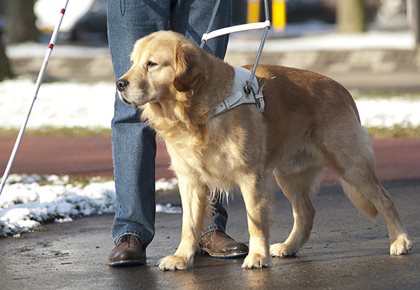Fair Housing Act: Service Animals - A Nail without a Hammer
 By Jeffrey Rembaum, Esq. with the law firm of Kaye Bender Rembaum
By Jeffrey Rembaum, Esq. with the law firm of Kaye Bender RembaumWhen it comes to service dogs and assistance animals, people often confuse the Federal American with Disabilities Act (ADA) with the Federal Fair Housing Act (FHA). The ADA laws apply only to commercial (non-residential) settings. They apply to specifically trained service dogs (and the very occasional miniature horse). The ADA laws specifically exclude emotional support animals of any kind. On the other hand, the FHA laws apply to residential communities and apply to pretty much all domestic animals, including dogs, cats, pot belly pigs, etc. The FHA laws allow a person living in a residential community access to both specifically trained and untrained animals and, importantly, include the sub-category of the much beloved emotional support animal, especially when they might be otherwise prohibited by the community’s governing documents. While the ADA uses the term “disability” and the FHA uses the term “handicap,” these two terms are, for all intents and purposes, interchangeable.
What is missing from both the FHA and the ADA are penalties to prevent against fraudulent misuse of both acts. In trying to create conformity with FHA and the ADA protections and greater protection against fraud, the Florida Legislature has brought the definition of an “individual with a disability” as set out in Chapter 413, Florida Statutes, into conformity with both the definitions for the terms “disability” and “handicap” as set out in the ADA and FHA, respectively. Florida’s newest legislation also defines the term “service animal” similar to the ADA legislation to mean an animal that is trained to do work, or perform tasks, for an individual with a disability and clarifies that the crime- deterrent effect of an animal’s presence and the provision of emotional support, well-being, comfort, or companionship do not constitute work or tasks for purposes of this definition. But, a service animal does include a dog (or miniature horse) trained to assist mentally and emotionally disabled individuals with such tasks as helping an individual with a psychiatric or neurological disability by preventing or interrupting impulsive or destructive behaviors, reminding an individual with mental illness to take prescribed medications or calming an individual with posttraumatic stress disorder during an anxiety attack. The important distinction is the dog’s training.
It is important for community associations to remember that, although this new State law exists, community associations must ensure that they do not run afoul of the Federal Fair Housing Act by requiring that an “assistance animal” be a dog or be specifically trained to assist with the disability. If so, then FHA penalties will apply.
Chapter 413, Florida Statutes, also provides that a disabled person is entitled to rent, lease or purchase any housing accommodations offered for rent, lease or purchase in this state as any other member of the general public would be entitled, and is entitled to full and equal access to all housing accommodations and cannot be required to pay an extra fee for the service animal, which is in conformity with its Federal counterparts, the ADA and the FHA.
What has really gotten people talking is that this new law makes it a second degree misdemeanor offense for a person to knowingly and willfully misrepresent herself or himself, through conduct or verbal or written notice, as using a service animal, being qualified to use a service animal or as a trainer of a service animal. Those who are found to have done so may serve up to 60 days imprisonment or pay a fine of $500.00 and must perform 30 hours of community service for an organization that serves individuals with disabilities or for another organization selected by the court to be completed in not more than six months. So, what does all this mean? It means that while there is a penalty for misrepresentation where it concerns a trained service dog or miniature horse, there is still no penalty ascribed for the one major area where the most abuse occurs, that of the qualification to own an emotional support animal!
In summary:
- As to residential settings inclusive of Florida’s community associations, if the dog is specifically trained to assist its owner with a handicap or disability, then the FHA and the laws set out in Florida’s Chapter 413 apply. Fraudulent penalties apply.
- If an animal is not trained and otherwise qualifies as an emotional support comfort animal, then only the FHA applies. No fraudulent penalties apply.
- As to non-residential settings, if the animal is a dog or miniature horse and is specially trained, then the ADA and Florida’s Chapter 413 apply. Fraudulent penalties apply.
To learn more about how partnering with a professional, quality property management company can enhance the value of your property and the lives of your residents, contact FirstService Residential, Florida’s leading property management company.